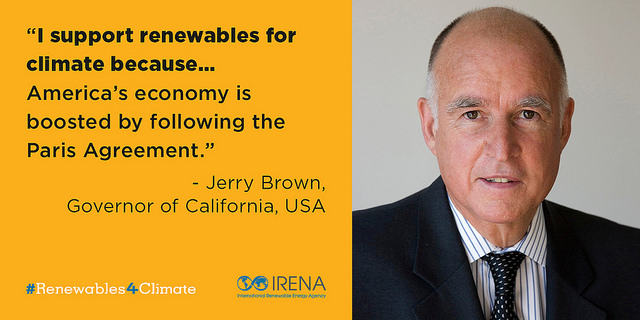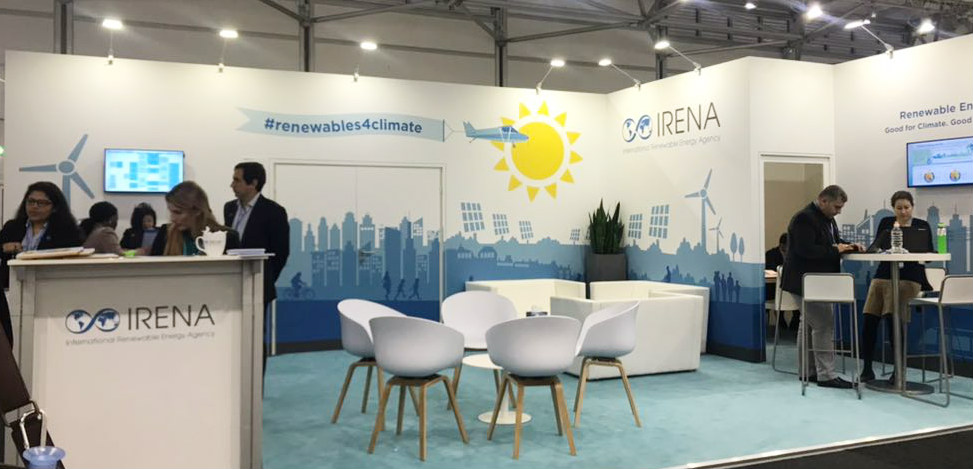
IRENA at COP23
The adoption and entry into force of the Paris Agreement represents an unprecedented global deal to take deliberate and concerted action to combat climate change and keep the global temperature rise below two or even one-and-a-half degrees Celsius above pre-industrial levels.
To meet even the less stringent of the two Paris goals, the global energy system needs to be fully decarbonized by 2060, despite an expected tripling of global GDP during the same period. This requires a more than seven-fold increase in the deployment of renewables compared to the growth that we have seen over the past decade, with renewables comprising two-thirds of global energy supply by 2050.
As the world’s platform for renewable energy co-operation, IRENA is uniquely positioned to bring together governments, industry, civil society and individuals to identify ways to accelerate and deepen the decarbonisation of the global economy.
As such, IRENA played a vital role in ensuring that renewables are a key part of the climate solution, hosting high-level side events and more than a dozen panel discussions and workshops, running the renewable energy hub at the IRENA pavilion, and conducting public information campaigns at COP23.
IRENA's Pavilion and Events at COP23
As the hub for renewable energy-related activities at COP23 IRENA convened a series of renewables events, exhibitions and discussions at its Pavilion at set times throughout the event. Starting from November 7, this platform for open dialogue on renewables featured a rich diversity of presentations, talks, information and media events from IRENA and partner organizations everyday throughout COP23 other than on November 12 (Renewable Energy Day).
For a full timetable of the IRENA Pavilion events, see the Pavilion schedule.

#Renewables4Climate: The IRENA Coalition for Action, a global network of private companies, industry associations, organisations, research institutes and civil society members, had developed a joint campaign for COP23 that aims to raise awareness about renewable energy as a key solution to climate change. The campaign called on members of the public to join the global conversation by tagging any renewable energy-related content before, during and after COP23 with the #renewables4climate, highlighting the actions that they as individuals or as representatives of an organization, community or company, were taking to deploy renewables as a solution to climate change.
Public Awareness: In addition to a full complement of high-level engagements, side events, and targeted campaigns, IRENA conducted a public awareness campaign throughout the city of Bonn during COP to raise awareness about the benefits of renewable energy, the need to accelerate the decarbonisation of the global economy. Installations included a renewable-energy themed tram and photo cubes, among others.
The Round Table on Bioenergy for Sustainable Development (7 November)
The Round Table discussed a briefing paper on Bioenergy for Sustainable Development which IRENA prepared with the IEA Technology Collaboration Programme on Bioenergy (IEA Bioenergy) and the United Nations Food and Agriculture Organization (FAO). The main point of the brief is that significant amounts of bioenergy can be produced without jeopardizing food production or emitting carbon to the atmosphere. In other words, bioenergy can support three key Sustainable Development Goals, among others: sustainable energy for all, adequate nutrition for all, and combatting climate change. It highlights sustainable measures to collect more farm and forest residues and to make more land available for bioenergy crops by boosting yields on food crops, reducing waste and losses in the food chain, and restoring degraded land.
More about bioenergy for sustainable development can be found here: Growing Sustainably with Bioenergy.
Energy Day: Marrakesh Partnership for Global Climate Action (10 November)
Energy Day at COP23 told the story of the ongoing energy transformation, showcased success stories, took stock of commitments made, and offered recommendations on the way forward. Participants shared their visions for the future of energy; companies described why they are going 100% renewable, leaders of energy efficiency initiatives demonstrated the business case for their work; state, region and city leaders discussed ambitious climate and clean energy policies; and industry leaders showcased innovation and breakthroughs in their fields. Speakers also identified obstacles and challenges, and the means to overcome them.
Renewable Energy Day: Accelerating the Global Energy Transition (12 November)
IRENA, in partnership with the Governments of Fiji, Germany and the United Arab Emirates, and Deutsche Post DHL, hosted a high-level event to explore cutting-edge ideas and innovations at the forefront of renewable energy. The event brought together leading actors in the energy sector to highlight success stories of cross-border and cross-sector integration and cooperation, and engaged a broad spectrum of actors to explore paradigm-shifting approaches and technologies.
SIDS Day: Strengthening Resilience through Energy Transformation (13 November)
To draw attention to the unique context of small island developing states (SIDS) with regards to the global energy transformation, IRENA dedicated a full day of SIDS-focused programming at the IRENA Pavilion, culminating in a high-level ministerial discussion and reception at the Bonn Art Museum (Kunstmuseum). The discussion took place within the framework of IRENA’s SIDS Lighthouses Initiative and presented an opportunity for leaders to share their priorities with regards to climate change.
Implementing Renewable Energy Targets in African NDCs (15 November)
With a burgeoning population and rapid economic growth, Africa has among the world’s highest potential energy demand. Furthermore, 52 out of 54 African countries mentioned renewable energy in their NDCs, generating strong potential to drive rapid growth in renewable energy capacity through 2030. The side event explored the role of climate policies in facilitating financial flows to renewable energy projects, on leveraging sustainable private finance, and risk mitigation.
High-Level Roundtable on Geothermal in the Global Energy Transformation: What Way Forward? (16 November)
This High-Level Roundtable on “Geothermal in the Global Energy Transformation: What way forward?” gathered high-level representatives to examine how geothermal energy can play a role in the achievement of decarbonisation goals and in the implementation of nationally determined contributions (NDCs). The event offered an opportunity to discuss how the Global Geothermal Alliance (GGA) can further contribute to facilitating the exchange of experiences and best practices, mobilising finance to unlock geothermal investments and providing modern and sustainable energy services for all countries. The event was organised by IRENA under the umbrella of the GGA initiative, which was launched during COP21 in December 2015 to serve as a global platform for improved dialogue, cooperation and coordinated action among policy makers, industry, and other stakeholders.


